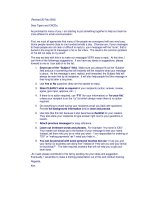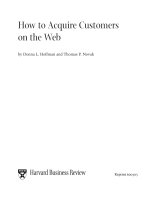Tài liệu How to write great essays part 13 pptx
Bạn đang xem bản rút gọn của tài liệu. Xem và tải ngay bản đầy đủ của tài liệu tại đây (80.2 KB, 7 trang )
109
TIMED PROMPT 4
Describe the purposes of the Internet. Include various viewpoints, including that of users and
providers.
In today’s world, the first place people turn to when there is a question to be
answered, information to be located, or people to be contacted, is often the
Internet. The Internet has supplanted the traditional encyclopedia as well as a
number of other sources of service and information. We can make reserva-
tions, plan vacations, play interactive games, learn a language, listen to music
or radio programs, read the newspaper, and find out about a medical condition,
without coming face to face with another person. There is no limit to the sub-
ject matter you can research on the Internet. The Internet allows you to
remain at your computer and shop no matter what you wish to purchase. And
if you are looking for a bargain or an unusual item, you can go to a popular
auction site and either sell or buy.
But if you do wish to speak directly to a person, there are chat rooms. On
practically any given topic, groups of people converse with each other. They
may be giving opinions about a perfect travel itinerary, a book, or even a polit-
ical party. But perhaps the widest use of the Internet involves directly writing
to a person by sending e-mail messages to friends and associates. It is possi-
ble to communicate instantly with anyone, anywhere, as long as there is an
Internet connection. In addition to verbal messages, digital pictures may be
transmitted on the Internet.
Unfortunately, there are individuals who misuse the opportunities possible on
the Internet. They are less than honest, disguise their identity, bilk people in
financial scams, and entice unsuspecting people, including children, into giving
them personal information. They steal people’s identities and use their credit
and good names to make purchases, apply for loans, and steal assets.
Of course, the Internet providers, such as AOL, hope to make a profit, and
there is usually a monthly fee for the hookup. To increase the profits, the
providers sell advertising, which may pop up on the subscriber’s screen and
require the user to stop and respond, either positively or negatively, to the ads.
When you consider that you can hear a concert, read a book, visit a museum
and view its contents, visit the websites of numerous individuals and organizations,
play a game with one or more people, and pay your bills, you will realize that the
uses of the Internet are too vast for a short list. Most would agree that much
has been added to peoples’ lives by connecting them to the Internet, and that we
probably cannot anticipate what new purposes will be explored in the future.
Sample Essay Prompts and Essays CHAPTER 8
HOW TO WRITE GREAT ESSAYS
HOW TO WRITE GREAT ESSAYS
CHAPTER 8 Sample Essay Prompts and Essays
110
EVALUATION
This essay satisfies the requirements of the writing prompt, providing a look at the uses of
the Internet by users (both good and bad) and providers. It is well-organized and easy to
follow because of paragraph breaks and transitional words and phrases. The vocabulary is
sophisticated, which elevates this essay. There are almost no errors in grammar, usage, or
mechanics.
TIMED PROMPT 5
Personification is the technique wherein a non-human character is given human thoughts, feel-
ings, and dialogue. Illustrate how this technique is used in your favorite novel or short story.
Personification is the technique where the author gives non-human charac-
ters human thoughts, speech, and feelings. This is used well by Rudyard Kipling
in his short story “Rikki-Tikki-Tavi.”
Without personification, the main character, who is a mongoose, would not
be able to express his feelings. The story would need a narrator, like the kind
you see on television’s Wild Discovery. Some of those documentaries show ani-
mals in the wild, while a narrator tells the audience why the animals behave
certain ways. With personification, a non-fictional event can be fictionalized.
For example, a mongoose’s natural enemy in the wild is the cobra. In
“Rikki-Tikki-Tavi,” the mongoose is the hero, while the cobra is the villain. Both
animals have conversations with other animals and the reader can see what
they are thinking about. Rikki-Tikki is nervous to fight the cobras, but doesn’t
show it when he starts to battle. I like how the author lets the story unfold
through personification.
Although Rikki can’t talk with his human family, he behaves like a family
pet. When the cobras plot to kill the family, Rikki defends them by killing the
snakes. This story follows the common theme of good versus evil. Without per-
sonification, the story would not be so enjoyable.
EVALUATION
The writer of this essay makes some good points about personification (it allows the char-
acters to express their feelings, helps the story unfold, and makes it more enjoyable), and
uses examples from the Kipling story throughout. It is also organized, discussing three main
points, and transitioning well between them. However, it could be improved through bet-
ter variety of sentence structure and greater development of ideas.
Note: For more information about resources to help you write a successful essay, read the
Resources at the end of this book.
110
111
Resources
RESOURCES
HOW TO WRITE GREAT ESSAYS
M
M
any print and online references were mentioned throughout How to Write Great
Essays
. Here, you will find more specific sources of information, including online
help with text anxiety and many of the best grammar books in print.
E
SSAY
I
NFORMATION
SAT
Online
■
www.collegeboard.com—information from the creator of the SAT
■
Because the SAT essay was given for the first time in 2004, be certain you use
only the latest editions of SAT preparation and information books.
HOW TO WRITE GREAT ESSAYS
RESOURCES
112
GED
Online
■
www.gedonline.org—literacy’s site on how to prepare for the GED essay.
■
GED Exam Success in Only 6 Steps (New York: LearningExpress, 2003).
REGENTS
Online
■
www.gsu.edu/~wwwrtp/—State of Georgia Regent’s Site, with sample essay
test form, list of topics, and scoring information
■
Search for specific information on your state’s test using your state name and
“Regents essay” as search terms.
COLLEGE APPLICATION
Online
■
www.collegelink.com—This site’s services include college and scholarship
searches, test preparation, electronic college applications, and advice on pay-
ing for college. You can order either hard copies or Portable Document For-
mat (PDF) applications.
■
www.xap.com—Almost 600 applications, scholarship and college searches,
career information, and a high school planner are found here. No general
information entry; each application must be filled out individually. Xap.com
also runs 29 mentor sites, most state-based, which also provide online applica-
tions, as well as a confidential way to communicate with a college in which
you may be interested. You may also transfer data from your applications
directly to the FAFSA (Free Application for Federal Student Aid) on the WEB
financial aid application.
■
Starkey, Lauren. Goof-Proof College Admissions Essays (New York: Learning-
Express, 2003).
112
RESOURCES
HOW TO WRITE GREAT ESSAYS
113
D
EALING WITH
T
EST
A
NXIETY
Online
■
www.utexas.edu/student/utlc/handouts/1305.html—How to Keep Calm Dur-
ing Tests
, from the University of Texas at Austin’s Learning Center.
■
www.sas.calpoly.edu/asc/ssl/tests.panic.tips.html—Combating Test Panic from
California Polytechnic State University Study Skills Library.
■
Secrets of Taking Any Test (New York: LearningExpress, 1997).
■
10 Secrets to Acing Any High School Test (New York: LearningExpress, 2003).
W
RITING
R
ESOURCES
Online
■
www.bartleby.com—without a doubt, the best online reference site. It has a
searchable database of reference guides, encyclopedias, and much more. Just
some of the works you will find here include
The American Heritage Dictio-
nary of the English Language
,Fowler’s Modern English Usage, The Elements of
Style
, and The American Heritage Book of English Usage.
■
guide to grammar and writing,
maintained by Professor Charles Darling of Capital Community College, in
Hartford, Connecticut, is a comprehensive site with a particularly useful “ask
grammar” service.
■
www.askoxford.com—site has sections on classic errors and helpful hints, bet-
ter writing, and ask the experts. You can sign up for “word of the day” e-mails,
or chat with others about language questions.
■
Writing Skills Success in 20 Minutes a Day (New York: LearningExpress, 2001).
S
PELLING
R
ESOURCES
Online
■
www.dictionary.com—this site provides a useful online dictionary (with the-
saurus). You can sign up for “word of the day” e-mails to help expand your
vocabulary.
■
www.funbrain.com/spell—this site is designed for young people with a Spell
Check spelling game.









